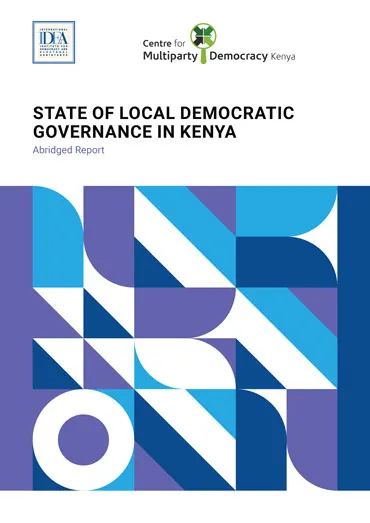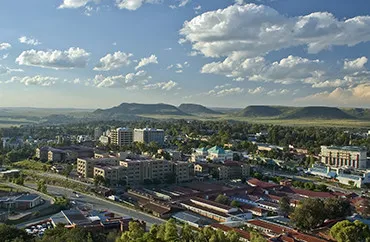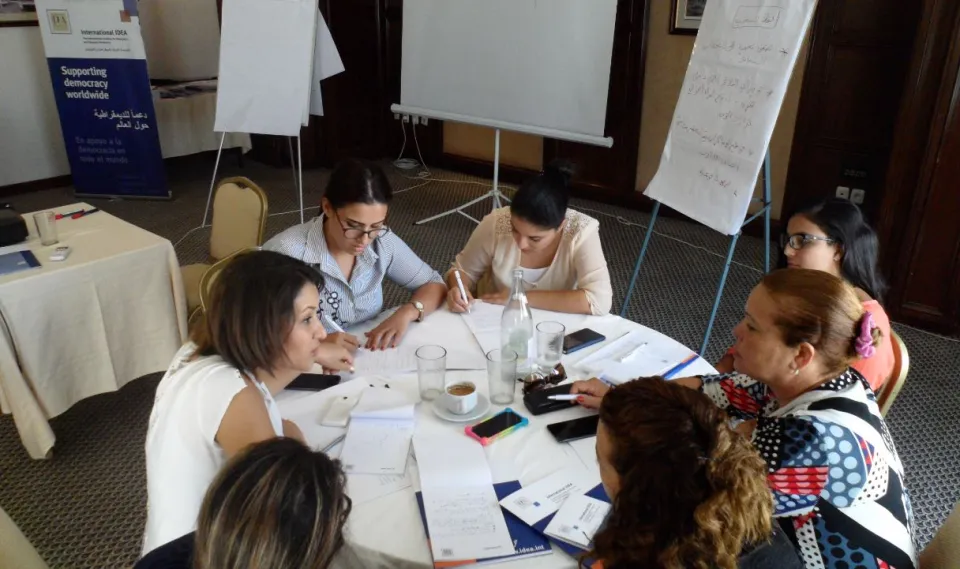COVID-19 and Women’s Political Participation in Africa: Challenges and Opportunities
The current Covid-19 pandemic has brought a sharper relief to issues attendant to Women’s Political Participation in Africa. The pandemic’s effects are being felt across the spectrum of the key areas of democracy foci for International IDEA that form the basis for the WPP consortium: constitution, elections, and political participation and empowerment.
Women in Political Participation numbers remain low in Africa due to both structural and societal reasons. The COVID-19 pandemic has led to declared state of emergency status by many African countries since March 2020 with both negative and positive impact on Women in Political Participation (WPP). While there are scheduled elections during COVID-19, the structural barriers for WPP persist. Amongst the thematic areas that form an important nexus with WPP are Gender Based Violence; Political finance; Cultural beliefs and practices; menstrual health; maternal health; comprehensive sexuality education and teenage pregnancies; safe abortion; HIV and AIDS; and sexual diversity. At a basic level, the issue of representation has also reared its head, with marked gender inequality demonstrated in the assembling of various African countries’s COVID-19 response teams.
Key opportunities for WPP during COVID-19 may be contextualised by country, however, some are similar across the eight countries that the consortium carries out its work, and beyond. The pandemic presents an opportunity for women political leaders and male leaders in support of WPP to demonstrate transformative leadership in their constituencies during the pandemic. This may include basic mobilisation of resources for community members to be aware of the effects of the pandemic. Countries that have scheduled elections in the near future are in full campaign mode despite COVID-19. Despite challenges that the pandemic has seen in some cases for political gain, WPP need to seize this opportunity in a number of areas such as pushing for policies that will incorporate gender responsive disaster management, pushing for investment in health care and empathy with community members who are affected. Above all, an opportunity presents in the area of Women Politicians’ potential exertion of influence beyond political party borders within a fairly fluid policy landscape.
Scope of Webinar Discussion
- Introduction and welcome remarks, Prof Adebayo Olukoshi, Regional Director for Africa and West Asia, International IDEA
- Introduction of Panellists and overview of webinar, Dr Pinkie Mekgwe, Senior Regional Advisor for Africa and West Asia, International IDEA
- Country contexts on COVID-19 and WPP
-Gender Links: Ms Sifisosami Dube
-IFAN: Prof Fatou Sow Sarr/ Prof Demba Fall
-PADARE: Ms Thando Makubaza
- WLSA: Ms Fadzai Traquino
Panel Members:
- Ms Ndu Sekgoma, Secretary General, SADC Parliamentary Forum
- Prof Pat Utomi, Past Presidential Candidate for Nigeria, and Head, The Values Centre, University of Nigeria
- Hon Millie Odhiambo, Member of Parliament and WPP Consortium Advisory Committee member
The Webinar will discuss the areas below. These may be expanded during the discussion:
- Data collection and analysis on WPP – The COVID-19 pandemic restrictions may have affected the data gathering on WPP, in particular registration of voters, data on perspectives of female political leadership (attitudes on WPP by the electorate), profiling of women in political leadership, collection of sex disaggregated data by Election Management Bodies and updating relevant databases on WPP
- Gender Based Violence (GBV) and WPP – With the adoption of State of Emergecy (SoEs) by many countries in Africa, a spike in GBV has been recorded across many countries. In some instances, such as in Zimbabwe, WPs have been specifically targeted for attack under a blanket of constitutional deviations that have caused confusion to varying degrees, and have in some cases led to increased power of the security forces, real and perceived
- Effects on the policy and legal framework - How has the pandemic affected the policy and legal framework of elections and WPP? For example, countries such as Zambia and Tanzania are preparing for elections (Tanzania in 2020, Zambia in 2021). Zambia is undergoing a Constitutional amendment debate (Bill 10) which may affect the electoral system and yet present opportunities for women to participate meaningfully in elections. Due to COVID-19, some of these policy changes may be derailed or be missed as gatherings are restricted. Online discussions of such policy changes are difficult in most parts of Africa. Women who are mostly affected by limited resources to access internet may be left out in such policy discussions
- Elections, COVID-19 and WPP – The COVID-19 pandemic has posed challenges for social gatherings as well as election campaigns. Countries such as Zimbabwe have put elections on hold during the COVID-19 period. However, countries such as Malawi proceeded to have their Presidential elections despite COVID-19 restrictions. In some countries, the pandemic is used as a political campaigning tool while in some countries it is an opportunity for women in leadership to demonstrate their transformative leadership skills. The questions that arises include how elections have been impacted by the pandemic and what opportunities have been gained or lost by women in political participation at both local and national level
- The role of media on WPP during the COVID-19 Pandemic – While media is likely to go with the impetus of selling news in a fear-gripped world, this may lead to COVID-19 news overtaking focus on WPP or failing to bring out the WPP nuance within the COVID-19 news. Those who are likely to be part of news sources are those with resources to provide COVID-19 relief and community assistance, of which women have limited resources to do so. Gender Links had to postpone its media monitoring as all news were clouded with COVID-19 response. The media needs to mainstream COVID-19 within hard stories such as political participation, economics etc. It would be interesting to find out how many COVID-19 news sources are from women during COVID-19
- Capacity building for WPP during COVID-19 – COVID-19 presents opportunities for WPP to maximise the use of online tools to lead. Although capacity building may be required in some instances, it is time that online systems are used for both accountability and delivering a social contract by political leaders. Women have lagged behind in accessing internet and technology. An opportunity for the consortium is to build the capacity of WPP to use online resources for campaigning, profiling themselves and serving their constituencies. While presented with the challenges of limited gatherings, online systems offer an important mitigation opportunity even in the face of the broader challenges of internet connectivity and accessibility
Moderator of meeting: Dr Pinkie Mekgwe
Objectives
The objectives of the virtual discussion are:
- To assess the impact of COVID-19 on WPP overall
- To share knowledge by highlighting country/context insights and innovation
- To assess the impact of the pandemic on policies and programmes that affect WPP
- To assess the readiness of countries in promoting WPP in a COVID19 environment. Aspects such as infrastructure, information and financial resources in relation to WPP will be discussed
- To discuss the sustainability and highlight key intervention points for the WPP programme in a COVID-19 environment overall
Expected outputs
Expected outputs from the webinar include success stories on COVID-19 and WPP, strategies on mitigating challenges faced by WPP during COVID-19, sharing of key events on WPP and COVID-19. The webinar will also discuss programme sustainability and relevance during COVID-19.
Target groups
The target groups for the webinar include:
- WPP Consortium members and their partners
- Women Political Leaders
- Male Political Leaders
- Women’s Rights Organisations
- Election Management Body representatives
- Academia
- Political Party Representatives
- Young women aspiring to be political leaders



